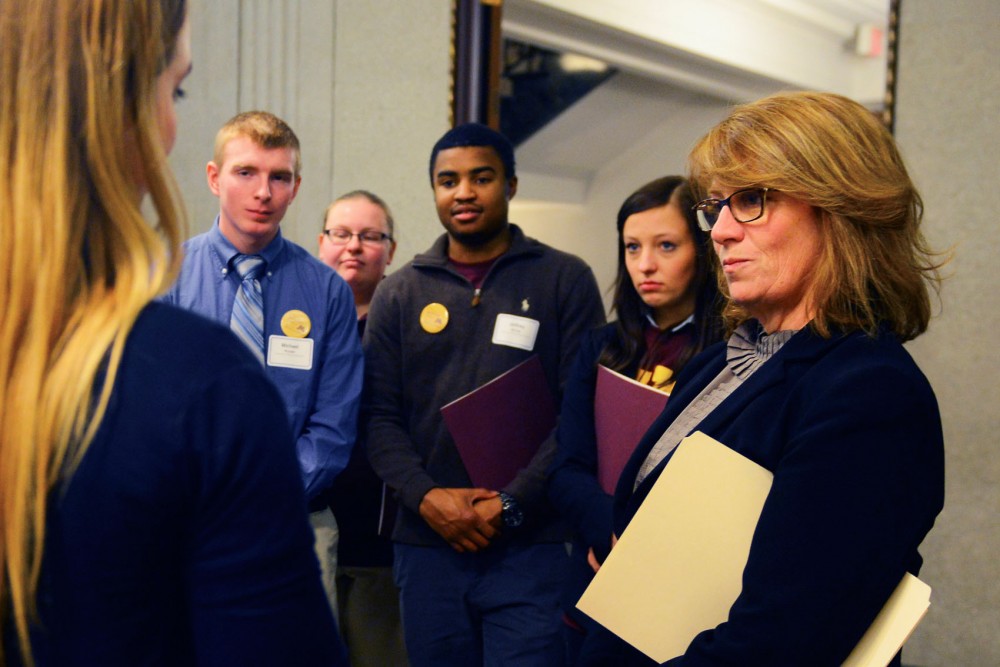University of Minnesota students flooded the state Capitol on Thursday to campaign for a continued tuition freeze.
More than 100 students rallied at the annual Support the U Day event, which gathers students from all five University campuses to meet with legislators to lobby for state funding.
This year, the advocates urged state leaders to fund an expanded in-state tuition freeze for the 2015-16 and 2016-17 school years, which would cost $65.2 million in total. This freeze would affect resident undergraduate, graduate and professional students on all system campuses.
“I would like to see a tuition freeze for all undergraduate students, as well as other aspects of the University budget request,” said Nick Wilson, a legislative staff member for the Minnesota Student Association, “State funding is something we need.”
Students gathered Thursday morning in Coffman Union to train and prepare to lobby the case for a tuition freeze as school leaders motivated the crowd.
“These are your legislators, you are their constituents, and they owe you an answer and they owe you a commitment,” University President Eric Kaler said in a speech.
University of Minnesota-Duluth student body president Jacob Froelich said despite financial issues that have affected their campus in recent years, Duluth students are committed to push for restrictions on tuition rates.
“While we do have some things on our agenda in Duluth … today is all about making sure tuition stays affordable,” he said.
Crookston Student Association Vice President Emily Campbell, a pre-veterinary medicine senior, said though she can afford paying for school now, she’s worried that she won’t be able to if tuition increases.
“I want to get through undergrad without loans because I am looking to take out $100,000 to $200,000 in loans once I go to vet school,” Campbell said. “By keeping tuition at what it is now, I would be able to afford college as it is.”
Though many legislators voiced their support for the tuition freeze, some were concerned about the feasibility of financing it.
“I do believe that the University needs to find ways to trim their budget, and make sure that college is affordable,” Rep. Debra Kiel, R-Crookston, said. “Somewhere along the route, somebody has to pay.”
Like Kiel, Sen. Kent Eken, DFL–Twin Valley, said while he supports a tuition freeze, he’s concerned that other state programs could suffer if it were to pass.
“You have to pay for things, you can’t just go and pass a tuition freeze without incurring some cost,” he said.
Grad students fight for recognition
Along with undergraduate students — who have reaped the benefits of the current tuition freeze — graduate and professional students also advocated at Support the U Day for another two-year tuition freeze, which would include them for the first time.
Graduate and professional students made up about half of the students who lobbied at the Capitol — the highest turnout ever for the post-undergraduate population, said Andrew McNally, the president of the Council of Graduate Students.
McNally said it’s vital that state leaders consider graduate and professional students in the freeze request because of their contributions in research at the University and within the state of Minnesota.
“[The students are] not taking from the state, they’re giving back,” he said.
Ashley Hall, a student in the University’s veterinary medicine program and vice president of the Graduate and Professional Student Assembly, was one of several speakers at the Coffman Union rally advocating for increased financial support for graduate and professional students.
She said graduate and professional students have traditionally been overlooked in tuition rate discussions, so her main focus on Thursday was to educate legislators about the financial burdens they face.
A tuition freeze would save a graduate student about $1,600 over a two-year master’s degree.
While Hall said she’s happy to see post-undergraduates paying in-state tuition receiving more support from the University, she said the school should also consider helping out-of-state students like herself.
Because Hall, who is from Georgia, pays out-of-state tuition, she said she’s taking out the maximum amount of loans in order to afford her education and will be in a great deal of debt after graduation.
“When we start having declining out-of-state admission because of the rates being so high, I worry about the integrity of the program,” she said.
Rep. Clark Johnson, DFL- North Mankato, was one of the legislators who spoke with students Thursday. He said he supported the tuition freeze for undergraduate students in 2013, and believes it’s important that the budget request also includes graduate and professional students.
“I understand that at the graduate level there’s always pressure in the budget, so we’ll see if we can pull that off,” he said. “But that’s a very valid [request].”
COGS executive board member Keaton Miller said though he recognizes that funding for a freeze may be difficult to secure, legislators seemed receptive to the students’ pleas.
“I think we had a lot of positive conversations,” he said. “The environment at the Capitol, I think, is a little bit tougher this year, but I think we had the discussions we needed to have about the value of investing in the University of Minnesota.”








